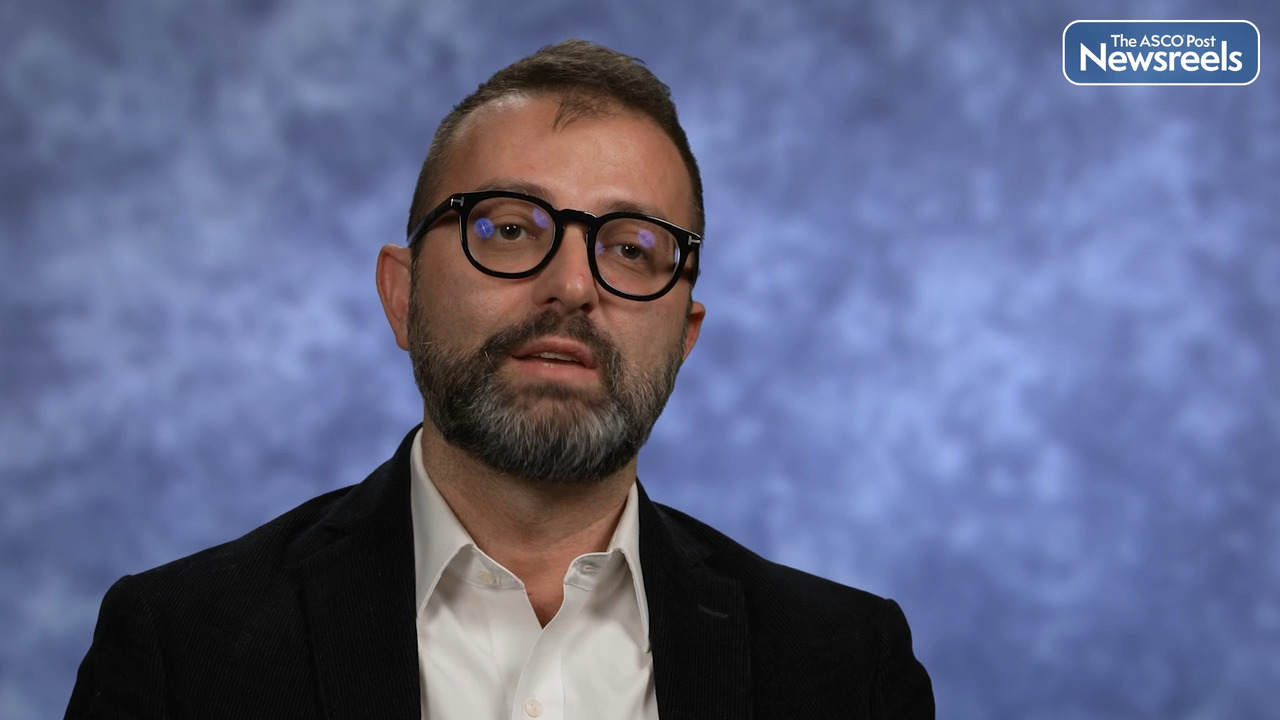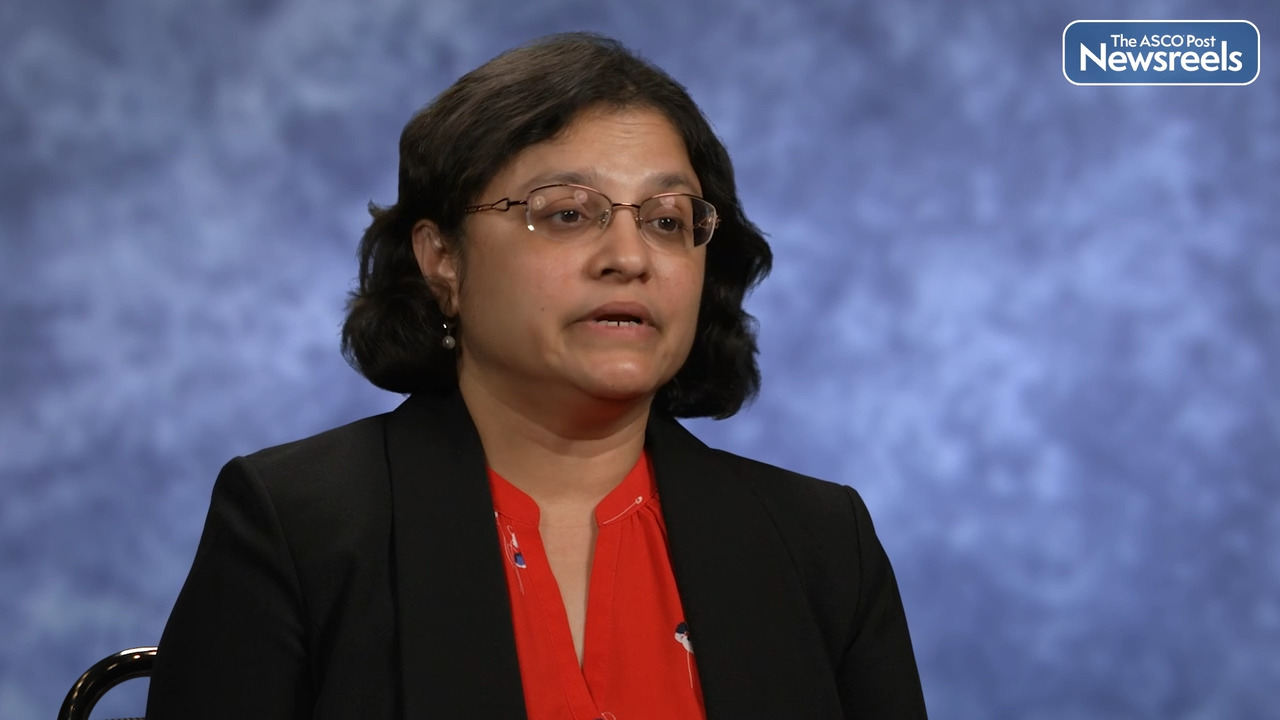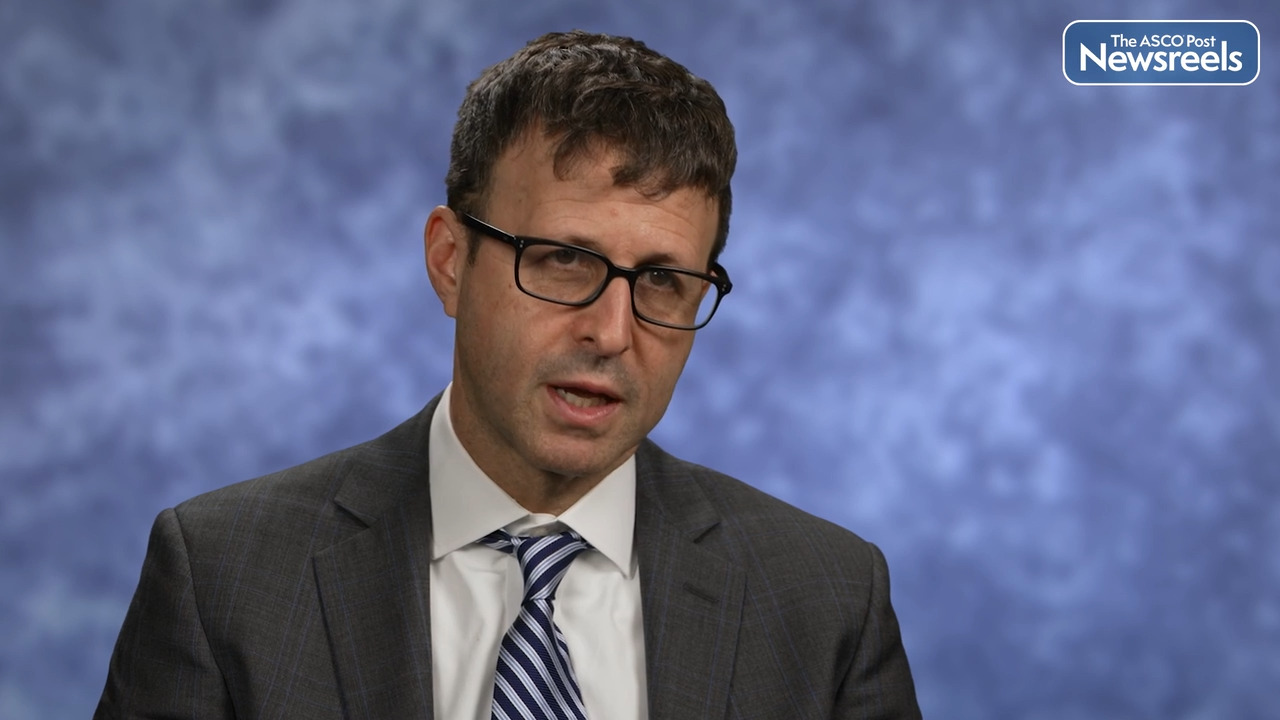ELCC 2023: New Data on Amivantamab-vmjw in Patients With Advanced NSCLC and EGFR Exon 20 Insertion Mutations
New long-term data from the CHRYSALIS study evaluating amivantamab-vmjw in patients with advanced non–small cell lung cancer (NSCLC) and EGFR exon 20 insertion mutations whose disease progressed on prior platinum-based chemotherapy were presented by Lopez et al at the 2023 European Lung Cancer...
CAR T-Cell Therapy May Improve Quality of Life of Patients With Hematologic Malignancies
Patients with hematologic malignancies may experience a significant improvement in their reported quality of life 6 months after receiving chimeric antigen receptor (CAR) T-cell therapy, according to a new study published by Johnson et al in Blood Advances. Background Although CAR T-cell therapy...
Nivolumab Injected Directly Into Spinal Fluid May Be Safe and Effective for Some Patients With Melanoma Who Have Leptomeningeal Disease
Researchers have found that a novel approach to administer intrathecal and intravenous nivolumab has proven safe and improved survival in a subset of patients who developed leptomeningeal disease from metastatic melanoma, according to a new study published by Glitza Olivia et al in Nature ...
How Do Novel Genetic Subtypes of Urothelial Carcinoma Respond to Immune Checkpoint Blockade?
In a study reported in the Journal of Clinical Oncology, Sarfaty et al identified novel genetic subtypes of urothelial carcinoma exhibiting different responses to immune checkpoint blockade. Study Details In the multicenter study, whole-exome sequencing was performed on tumor specimens from 88...
FDA Grants Full Approval to Pembrolizumab for Certain Adult and Pediatric Patients With Advanced MSI-H or dMMR Solid Tumors
On March 29, the U.S. Food and Drug Administration (FDA) granted full approval to the anti–PD-1 therapy pembrolizumab for the treatment of adult and pediatric patients with unresectable or metastatic microsatellite instability–high (MSI-H) or mismatch repair–deficient (dMMR) solid tumors, as...
RUBY Trial: Dostarlimab Plus Carboplatin and Paclitaxel in Advanced Endometrial Cancer
Adding immunotherapy to standard chemotherapy for the first-line treatment of advanced or the first recurrence of endometrial cancer significantly improved progression-free survival compared to chemotherapy alone, according to data presented by Mansoor Raza Mirza, MD, and colleagues at the March...
ASCO Updates Guideline on Sacituzumab Govitecan-hziy in Hormone Receptor–Positive, HER2-Negative Metastatic Breast Cancer
ASCO has released a rapid recommendation update to the guideline on chemotherapy and targeted therapy for endocrine-pretreated or hormone receptor–negative metastatic breast cancer, addressing the use of sacituzumab govitecan-hziy in patients with endocrine-resistant, hormone receptor–positive,...
DESTINY-Breast03: T-DXd Improves Overall Survival vs T-DM1 in Previously Treated HER2-Positive Metastatic Breast Cancer
As reported in The Lancet by Sara A. Hurvitz, MD, of the David Geffen School of Medicine, University of California, Los Angeles, Jonsson Comprehensive Cancer Center, and colleagues, updated results of the phase III DESTINY-Breast03 trial showed significantly improved overall survival with...
Idecabtagene Vicleucel vs Standard Regimens in Patients With Relapsed or Refractory Multiple Myeloma
As reported in The New England Journal of Medicine by Paula Rodriguez-Otero, MD, PhD, of Clínica Universidad de Navarra, Pamplona, Spain, and colleagues, an interim analysis of the phase III KarMMa-3 trial has shown superior progression-free survival with the B-cell maturation antigen–directed...
Regular Approval for Dostarlimab-gxly in dMMR Recurrent or Advanced Endometrial Cancer
On February 9, 2023, dostarlimab-gxly was granted regular approval for adults with mismatch repair–deficient (dMMR) recurrent or advanced endometrial cancer, as determined by a U.S. Food and Drug Administration–approved test, whose disease has progressed on or following a prior platinum-containing...
Expert Point of View: Xin Gao, MD
Xin Gao, MD, Assistant Professor, Harvard Medical School, Genitourinary Cancers Program, Mass General Cancer Center, commented on the results from TROPHY-U-01 cohort 2. “These data add to the overall data on the efficacy of sacituzumab govitecan in patients with metastatic urothelial cancer. This...
Sacituzumab Govitecan-hziy Achieves Response After Disease Progression on Immune Checkpoint Inhibitor in Metastatic Urothelial Cancer
Treatment with the antibody-drug conjugate sacituzumab govitecan-hziy achieved an objective response rate of 32% in platinum-ineligible patients with metastatic urothelial cancer who experienced disease progression on an immune checkpoint inhibitor, according to the primary analysis of the...
Pembrolizumab Plus Ifosfamide, Carboplatin, and Etoposide in Relapsed or Refractory Classical Hodgkin Lymphoma
In a phase II trial reported in JAMA Oncology, Locke J. Bryan, MD, and colleagues found that the combination of pembrolizumab with ICE chemotherapy (a regimen including ifosfamide, carboplatin, and etoposide) produced a high rate of complete response in patients with relapsed or refractory...
Neoadjuvant Dual Immunotherapy Plus Chemotherapy Improves Patient Outcomes in Operable Lung Cancer
In the phase II NEOSTAR trial, adding ipilimumab to a neoadjuvant combination of nivolumab plus platinum-based chemotherapy resulted in a major pathologic response in half of all treated patients with early-stage, resectable non–small cell lung cancer (NSCLC). New findings from the NEOSTAR study,...
Elizabeth Smyth, MD, Offers Insight on KEYNOTE-859 Findings
The invited discussant of KEYNOTE-859,1 Elizabeth Smyth, MD, consultant in gastrointestinal oncology at Cambridge University Hospitals NHS Foundation Trust in the United Kingdom, called the findings “practice-changing” but cautioned that better patient selection is needed to optimally apply them....
KEYNOTE-859 Interim Analysis: Overall Survival Benefit for First-Line Pembrolizumab in Advanced Gastric Cancer
Results of the interim analysis of KEYNOTE-859 are in, and they confirm the overall survival benefit of first-line immunotherapy plus chemotherapy in advanced gastric cancer.1 Pembrolizumab plus a fluoropyrimidine- and platinum-containing doublet provided a statistically significant improvement in...
Nivolumab Followed by Nivolumab/Ipilimumab Boosting in Nonresponders Among Previously Treated Patients With Advanced Urothelial Carcinoma
In a German-Austrian phase II study (TITAN-TCC) reported in The Lancet Oncology, Grimm et al found that a strategy of nivolumab monotherapy followed by immunotherapeutic boosting including high-dose ipilimumab in nivolumab nonresponders showed activity in patients with unresectable or metastatic...
Antibiotic Exposure Before Immune Checkpoint Inhibitor Treatment and Overall Survival in Older Patients With Cancer
In a study reported in the Journal of Clinical Oncology, Eng et al found that exposure to antibiotics within 1 year of starting immune checkpoint inhibitor therapy was associated with poorer survival among patients with cancer who were aged 65 years and older. Study Details The population-based...
Chemotherapy May Alter Immune Cell Landscape in Patients With Pancreatic Cancer
Chemotherapy may affect the immune system’s ability to attack tumors in patients with pancreatic ductal adenocarcinoma, according to a new study published by Werba et al in Nature Communications. Background Pancreatic ductal adenocarcinoma is hard to detect and treat, with a 5-year survival rate of ...
Neoadjuvant Plus Adjuvant vs Adjuvant Pembrolizumab in Advanced Melanoma
In the phase II SWOG Cancer Research Network S1801 trial reported in The New England Journal of Medicine, Sapna P. Patel, MD, and colleagues found that neoadjuvant plus adjuvant pembrolizumab significantly improved event-free survival vs adjuvant pembrolizumab alone in patients with stage IIIB to...
Axicabtagene Ciloleucel in Refractory Large B-Cell Lymphoma: 5-Year Results of the ZUMA-1 Trial
As reported in the journal Blood by Sattva S. Neelapu, MD, and colleagues, 5-year outcomes from the the phase II ZUMA-1 trial showed that axicabtagene ciloleucel was associated with maintained response in one-third of patients with refractory large B-cell lymphoma. The estimated 5-year overall...
First-Line Pembrolizumab in Older Patients With dMMR Metastatic Colorectal Cancer
In a retrospective cohort study reported in JAMA Network Open, Saberzadeh-Ardestani et al found that first-line pembrolizumab was associated with clinically significant prolongation of survival outcomes in mostly older patients with mismatch repair–deficient (dMMR) metastatic colorectal cancer....
Addition of Pembrolizumab to Pemetrexed/Platinum in the First-Line Treatment of Metastatic Nonsquamous NSCLC: 5-Year Outcomes in the KEYNOTE-189 Study
As reported in the Journal of Clinical Oncology by Marina C. Garassino, MD, and colleagues, 5-year follow-up in the phase III KEYNOTE-189 trial has shown maintained progression-free and overall survival benefits with the addition of pembrolizumab to pemetrexed and platinum chemotherapy in the...
Immunotherapy Costs May Drive Increase in Medicare Spending for Outpatient End-of-Life Cancer Care
Researchers have discovered that recent increases in Medicare spending on outpatient end-of-life cancer care may have been driven almost entirely by costs associated with immunotherapy, which is given to fewer than one in five patients, according to a new study published by Mantz et al in the...
Combination Abatacept, Ruxolitinib, and/or Mechanical Ventilation May Decrease Mortality in Patients With Immune Checkpoint Inhibitor–Associated Cardiotoxicity
Although immune checkpoint inhibitors have substantially improved clinical outcomes in many cancer types, they have also been found to induce immune-related adverse events, including myocarditis, in about 1% of patients receiving the agents, which can lead to a mortality rate of up to 50%. Current...
Mediterranean Diet and Immune Checkpoint Blockade Outcomes in Advanced Melanoma
In the PRIMM study reported in JAMA Oncology, Bolte et al found that consumption of a Mediterranean diet was associated with a high probability of objective response and 12-month progression-free survival among patients receiving immune checkpoint blockade treatment for advanced melanoma. As stated ...
Association of Immune-Related Adverse Events With Overall Survival in Patients Receiving Atezolizumab-Containing Therapy for Metastatic Nonsquamous NSCLC
In a pooled analysis reported in JAMA Oncology, Mark A. Socinski, MD, and colleagues found that patients with nonsquamous non–small cell lung cancer (NSCLC) receiving atezolizumab who had grade 1 or 2 immune-related adverse events in clinical trials had improved overall survival vs those with no...
ASCO Endorses CAP Guideline to Better Define Who Benefits From Immune Checkpoint Inhibitor Therapy
ASCO has endorsed a new guideline from the College of American Pathologists (CAP) on the use of mismatch repair (MMR) and microsatellite instability (MSI) testing, which could help oncologists more accurately identify patients who may be suitable candidates for immune checkpoint inhibitor ...
KarMMa-3: Idecabtagene Vicleucel vs Standard Regimens in Patients With Relapsed or Refractory Multiple Myeloma
As reported in The New England Journal of Medicine by Rodriguez‑Otero et al, an interim analysis of the phase III KarMMa-3 trial showed superior progression-free survival with the B-cell maturation antigen–directed chimeric antigen receptor (CAR) T-cell therapy idecabtagene vicleucel (ide-cel) vs...
KEYNOTE-859 Interim Analysis: Overall Survival Benefit for First-Line Pembrolizumab in Advanced Gastric Cancer
Results of the interim analysis of KEYNOTE-859 are in, and they confirm the overall survival benefit of first-line immunotherapy plus chemotherapy in advanced gastric cancer. Pembrolizumab plus a fluoropyrimidine- and platinum-containing doublet provided a statistically significant improvement in...
Nivolumab and Relatlimab in Patients With Advanced Melanoma Progressing on Anti–PD-1/PD-L1 Therapy
As reported in the Journal of Clinical Oncology by Paolo Antonio Ascierto, MD, and colleagues, the phase I/IIa RELATIVITY-020 trial part D has shown evidence of activity of the combination of nivolumab and relatlimab in patients with advanced melanoma progressing on anti–PD-1/PD-L1 therapy. Study...
Nivolumab After Surgical Resection Improves Disease-Free Survival for Patients With High-Risk Muscle-Invasive Urothelial Carcinoma
Adjuvant therapy with the immune checkpoint inhibitor nivolumab following surgery improved disease-free survival in patients with high-risk muscle-invasive urothelial carcinoma, according to new findings presented by Matthew D. Galsky, MD, FASCO, and colleagues at the 2023 ASCO Genitourinary...
Study Finds Neoadjuvant Nivolumab Led to Improved 5-Year Survival Outcomes in Patients With Resectable NSCLC
Lung cancer remains the most commonly diagnosed cancer and the leading cause of cancer-related death worldwide, causing nearly 2 million deaths a year. Although treatment advances in late-stage non–small lung cancer (NSCLC) are extending survival in some patients, breakthroughs for early-stage...
Brexucabtagene Autoleucel in Relapsed or Refractory Mantle Cell Lymphoma in Standard-of-Care Practice
In an analysis from the U.S. Lymphoma CAR T Consortium reported in the Journal of Clinical Oncology, Wang et al found that standard-of-care treatment with brexucabtagene autoleucel in relapsed or refractory mantle cell lymphoma since its approval in this setting has been associated with response...
Blinatumomab Improves Survival in MRD-Negative, B-Cell ALL
The standard of care could be changing for adults with newly diagnosed BCR-ABL–negative B-lineage acute lymphoblastic leukemia (ALL) who achieve measurable residual disease (MRD) negativity after induction chemotherapy. In the phase III E1910 trial by the ECOG-ACRIN Cancer Research Group, an...
Addition of Pembrolizumab to Chemotherapy in First-Line Treatment of Metastatic Squamous NSCLC: 5-Year Update of KEYNOTE-407
As reported in the Journal of Clinical Oncology by Silvia Novello, MD, PhD, and colleagues, the 5-year update of the phase III KEYNOTE-407 trial showed continued overall survival and progression-free survival benefit with the addition of pembrolizumab to chemotherapy in the first-line treatment of...
ASCO Publishes New Guideline on Immunotherapy, Biomarker Testing in Advanced Head and Neck Cancer
A new ASCO guideline is available on the use of immunotherapy and biomarker testing for patients with recurrent or metastatic head and neck squamous cell carcinoma. The guideline provides recommendations related to PD-L1 and tumor mutational burden (TMB) testing, selection of therapy in the...
Carl H. June, MD, Honored With 2023 AACR Award for Lifetime Achievement in Cancer Research
The American Association for Cancer Research (AACR) will award Carl H. June, MD, with the 2023 AACR Award for Lifetime Achievement in Cancer Research during the AACR Annual Meeting 2023, taking place from April 14 to 19 in Orlando, Florida. Dr. June is the Richard W. Vague Professor in...
FDA Approves Sacituzumab Govitecan-hziy for Pretreated Patients With HR-Positive, HER2-Negative Breast Cancer
On February 3, the U.S. Food and Drug Administration (FDA) approved sacituzumab govitecan-hziy (Trodelvy) for patients with unresectable, locally advanced or metastatic, hormone receptor (HR)-positive, HER2-negative (immunohistochemistry [IHC] 0, IHC 1+, or IHC 2+ with a negative in situ...
Uptake of Immune Checkpoint Inhibitors and Survival Among Younger and Older Patients With Advanced NSCLC
In a U.S. cohort study reported in JAMA Oncology, Voruganti et al found that the uptake of immune checkpoint inhibitor therapy for patients with advanced non–small cell lung cancer (NSCLC) has been associated with “modest” improvements in overall survival, particularly among older patients. As...
Immunotherapy Combined With Targeted Therapy in Patients With BRAF V600E–Mutated Colorectal Cancer
In one of the first clinical trials combining immunotherapy and targeted therapy for patients with BRAF V600E–mutated colorectal cancer, researchers discovered that a combination regimen of dabrafenib, trametinib, and spartalizumab resulted in long-lasting responses. The study findings published by ...
FDA Approves Pembrolizumab as Adjuvant Treatment for NSCLC
On January 26, the U.S. Food and Drug Administration (FDA) approved pembrolizumab (Keytruda) for adjuvant treatment following resection and platinum-based chemotherapy in patients with stage IB (T2a, ≥ 4 cm), II, or IIIA non–small cell lung cancer (NSCLC). KEYNOTE-091 Efficacy was evaluated in...
Filippo Pietrantonio, MD, on Gastric or Gastroesophageal Junction Adenocarcinoma: Recent Data on Treatment With Tremelimumab and Durvalumab
Filippo Pietrantonio, MD, of Italy’s Istituto Nazionale dei Tumori, discusses phase II results from the INFINITY trial of tremelimumab and durvalumab as neoadjuvant treatment of patients with microsatellite instability–high (MSI) resectable gastric or gastroesophageal junction adenocarcinoma (GAC/GEJAC). These results open the way to investigate nonoperative management in patients with clinical, pathologic, and molecular complete response after T300/D (300 mg of tremelimumab and 1,500 mg every 4 weeks of durvalumab) (Abstract 358).
Analysis of Mutations Associated With High Tumor Mutation Burden in Microsatellite-Stable Gastrointestinal Cancers
In a study reported in The Lancet Oncology, Wang et al identified mutations linked to high tumor mutation burden in microsatellite-stable (MSS) gastrointestinal cancers that may be associated with efficacy of immune checkpoint inhibitor therapy. Study Details Molecular alterations in 48,606...
Cardiovascular Events Before and After Initiation of Immune Checkpoint Inhibitor Therapy for Cancer
In a study reported in JACC: CardioOncology, Lavanya Kondapalli, MD, of the University of Colorado School of Medicine, Aurora, and colleagues found that cardiovascular events common in the general population were observed both prior to and after the initiation of immune checkpoint inhibitor therapy ...
Risks of Cardiovascular and Immune-Related Adverse Events in Immune Checkpoint Inhibitor Therapy
In a single academic hospital network retrospective case-control study reported in JACC:CardioOncology, Charlotte Lee, MD, of Columbia University Irving Medical Center, New York, along with senior author Tomas Neilan, MD, MPH, of Massachusetts General Hospital and colleagues found that patients...
Study Explores the Addition of First-Line Atezolizumab in BRAF V600–Mutant Advanced Melanoma
As reported in The Lancet Oncology by Paolo A. Ascierto, MD, of the Istituto Nazionale Tumori Istituto di Ricovero e Cura a Carattere Scientifico Fondazione Pascale, Naples, and colleagues, the second interim overall survival analysis of the phase III IMspire150 trial has shown a numeric but...
Manik A. Amin, MD, on Novel Immune Therapies in GI Cancers: What’s on the Horizon?
Manik A. Amin, MD, of Dartmouth Cancer Center, discusses the future of immunotherapy in gastrointestinal cancers, the challenges of creating effective adoptive cell therapies, and the next generation of immune checkpoint inhibitors.
Richard S. Finn, MD, on HCC: Tislelizumab vs Sorafenib, and Their Impact on Quality of Life
Richard S. Finn, MD, of the David Geffen School of Medicine at the University of California, Los Angeles, discusses findings from the RATIONALE-301 study, which showed that patients with unresectable hepatocellular carcinoma (HCC) treated with first-line tislelizumab had better health-related quality-of-life outcomes compared with those treated with sorafenib, particularly in terms of fatigue and physical functioning. These results, along with the effects on overall survival, response rate, and a favorable safety profile, support the benefit of tislelizumab as a potential first-line treatment option in this patient population (Abstract 495).
Real-World Use of Idecabtagene Vicleucel for Patients With Relapsed or Refractory Multiple Myeloma
In a retrospective study of the real-world use of idecabtagene vicleucel reported in the Journal of Clinical Oncology, Hansen et al found that response rates and toxicity in patients with relapsed or refractory multiple myeloma were comparable to those in the pivotal phase II KarMMa trial; the...



